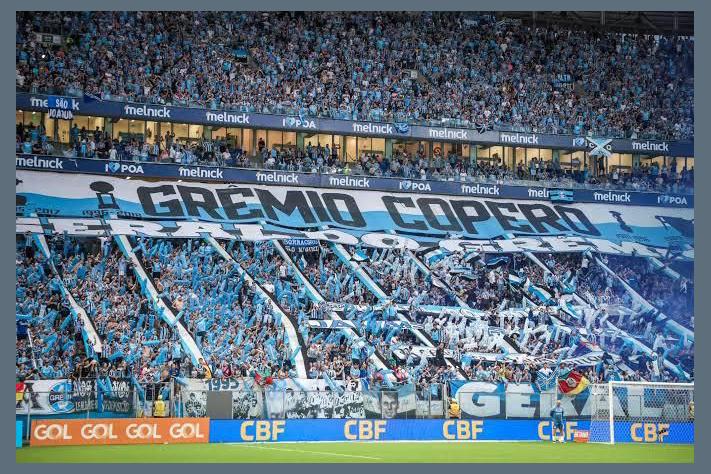 Geral do Grêmio
Geral do Grêmio
Geral do Grêmio: A Symphony of Grêmio Pride and Controversy
Amidst the vibrant musical tapestry of Porto Alegre, Brazil, emerged Geral do Grêmio, a band whose anthems have become synonymous with the unwavering passion of Grêmio Foot-Ball Porto Alegrense, one of the nation's most celebrated football clubs.
Genesis and Challenges:
Geral do Grêmio was born in 1993, an organic outgrowth of the club's dedicated fan base. The band members, hailing from Porto Alegre's working-class neighborhoods, shared a deep-seated love for Grêmio and a desire to amplify their support through music. Their early performances were humble affairs, held in bars and community centers around the city.
However, the band's popularity grew exponentially as their infectious melodies and spirited lyrics resonated with Grêmio supporters across generations. Their performances at Grêmio's historic Estádio Olímpico Monumental became legendary, transforming matches into communal celebrations of the club's rich history and indomitable spirit.
Controversies and Censorship:
Despite their immense popularity, Geral do Grêmio has not been immune to controversy. Their lyrics, often laced with explicit language and anti-establishment sentiments, have occasionally drawn the ire of authorities. In 2002, their album "Doce Loucura" was banned from sale by a local judge, who deemed some of its songs to be "morally offensive."
Undeterred, the band continued to push the boundaries of musical expression, challenging societal norms and advocating for social justice. Their music became a platform for the marginalized voices of Porto Alegre's urban youth, earning them both admiration and criticism.
Discography and Legacy:
Over the years, Geral do Grêmio has released numerous albums and singles, each imbued with the same raw energy and unwavering loyalty to Grêmio. Their most iconic song, "Hoje Eu Vim Te Apoiar," has become an anthem for the club's supporters, played at every home match and chanted with religious fervor. Other notable tracks include "União Azul," "Canta Tricolor," and "Vamo Tricolor," which have become integral to the club's cultural heritage.
Members and Collaborations:
Geral do Grêmio's current lineup consists of:
* Zeca (vocalist)
* Paulinho (bass)
* Marquinhos (guitar)
* Túlio (drums)
* Péricles (percussion)
The band has also collaborated with numerous other musicians and artists over the years, including fellow Grêmio supporters and renowned Brazilian musicians. Their music has transcended the boundaries of football, finding a receptive audience among music lovers of all stripes.
Conclusion:
Geral do Grêmio is a testament to the transformative power of music in fostering community and igniting passion. Their songs have not only become anthems for Grêmio supporters but have also opened up a dialogue on social issues and the role of art in society. Despite challenges and controversies, the band's unwavering commitment to their music and their beloved club has ensured their enduring legacy as one of the most influential voices in Brazilian popular culture.
Amidst the vibrant musical tapestry of Porto Alegre, Brazil, emerged Geral do Grêmio, a band whose anthems have become synonymous with the unwavering passion of Grêmio Foot-Ball Porto Alegrense, one of the nation's most celebrated football clubs.
Genesis and Challenges:
Geral do Grêmio was born in 1993, an organic outgrowth of the club's dedicated fan base. The band members, hailing from Porto Alegre's working-class neighborhoods, shared a deep-seated love for Grêmio and a desire to amplify their support through music. Their early performances were humble affairs, held in bars and community centers around the city.
However, the band's popularity grew exponentially as their infectious melodies and spirited lyrics resonated with Grêmio supporters across generations. Their performances at Grêmio's historic Estádio Olímpico Monumental became legendary, transforming matches into communal celebrations of the club's rich history and indomitable spirit.
Controversies and Censorship:
Despite their immense popularity, Geral do Grêmio has not been immune to controversy. Their lyrics, often laced with explicit language and anti-establishment sentiments, have occasionally drawn the ire of authorities. In 2002, their album "Doce Loucura" was banned from sale by a local judge, who deemed some of its songs to be "morally offensive."
Undeterred, the band continued to push the boundaries of musical expression, challenging societal norms and advocating for social justice. Their music became a platform for the marginalized voices of Porto Alegre's urban youth, earning them both admiration and criticism.
Discography and Legacy:
Over the years, Geral do Grêmio has released numerous albums and singles, each imbued with the same raw energy and unwavering loyalty to Grêmio. Their most iconic song, "Hoje Eu Vim Te Apoiar," has become an anthem for the club's supporters, played at every home match and chanted with religious fervor. Other notable tracks include "União Azul," "Canta Tricolor," and "Vamo Tricolor," which have become integral to the club's cultural heritage.
Members and Collaborations:
Geral do Grêmio's current lineup consists of:
* Zeca (vocalist)
* Paulinho (bass)
* Marquinhos (guitar)
* Túlio (drums)
* Péricles (percussion)
The band has also collaborated with numerous other musicians and artists over the years, including fellow Grêmio supporters and renowned Brazilian musicians. Their music has transcended the boundaries of football, finding a receptive audience among music lovers of all stripes.
Conclusion:
Geral do Grêmio is a testament to the transformative power of music in fostering community and igniting passion. Their songs have not only become anthems for Grêmio supporters but have also opened up a dialogue on social issues and the role of art in society. Despite challenges and controversies, the band's unwavering commitment to their music and their beloved club has ensured their enduring legacy as one of the most influential voices in Brazilian popular culture.